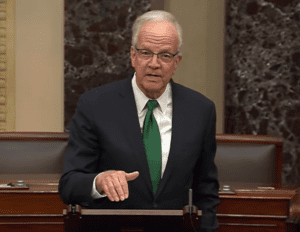OKLAHOMA CITY (Feb. 28, 2023) – Attorney General Gentner Drummond, along with Mississippi Attorney General Lynn Fitch, Delaware Attorney General Kathleen Jennings and attorneys general representing 33 other states, sent a letter to Congressional leaders this week informing them of an alarming issue with the National Human Trafficking Hotline and requesting their assistance to preserve the critical joint federal-state effort to end trafficking.
Since 2007, Polaris has operated the National Human Trafficking Hotline with funding authorized by Congress. Many states rely on the hotline to forward tips of suspected human trafficking to local law enforcement to arrest traffickers, safely recover victims and uncover evidence of trafficking rings and operations.
In recent months, it was discovered that Polaris only forwards tips to state law enforcement about adult victims in limited circumstances. This practice is contrary to what Polaris advertises, to what states and organizations have come to expect from this partnership, and, the attorneys general believe, to what Congress expects from its funding.
Additionally, in some cases, states have discovered a delay of several months before the hotline shared tips with states.
“Congressional leaders need to hold Polaris accountable and ensure that the hotline functions as intended, not as an obstacle to law enforcement officials working diligently to arrest criminals and save victims,” Drummond said.
Many states, federal agencies and organizations have actively engaged the public in utilizing the hotline for tips on trafficking to gather additional intelligence on trafficking operations, disrupt criminal activities and recover victims. Polaris has indicated no intention to revise its policies.
In their letter to Congress, the attorneys general wrote, “It appears to us that the hotline is not performing the services it is already funded to perform. Without changes to Polaris’s operating procedures, our state anti-trafficking initiatives gain little from participation in the National Hotline. As such, individual states may be forced to establish their own state hotlines, as some already have begun to do. A nationally run hotline not only achieves cost-efficiencies, but also ensures a uniform approach and allows for the collection of cross-state information with regard to human trafficking tips.”
The attorneys general continued, “We urge Congress to ensure that Polaris makes changes to its current and reported planned tip reporting policies to begin forwarding tips regarding suspected human trafficking of adults, in a prompt manner, to the corresponding state’s law enforcement officials for their evaluation and response to ensure victim safety. We cannot afford to lose the benefits of this federal-state partnership to end trafficking.”
In addition to Oklahoma, attorneys general from the following states signed the letter: Alabama, Alaska, Arizona, Arkansas, California, Connecticut, Delaware, Florida, Georgia, Idaho, Indiana, Iowa, Kentucky, Louisiana, Michigan, Mississippi, Missouri, Montana, Nebraska, Nevada, New Mexico, North Dakota, Ohio, Oregon, Pennsylvania, Rhode Island, South Carolina, South Dakota, Tennessee, Texas, Utah, Vermont, Virgin Islands, Virginia, and Wisconsin.













